Get the free Morning Headlines email for news from our reporters across the world
Sign up to our free Morning Headlines email
People across the UK will soon have a siren-like alert sent to their phones as part of an emergency warning system being trialled by the government.
Under the scheme, which will be trialled on 23 April, people will receive information alerting them of events including severe flooding, fires or extreme weather.
The government has said the alert system will save lives in the event of an emergency, with chancellor of the duchy of Lancaster, Oliver Dowden MP, saying: “We are strengthening our national resilience with a new emergency alerts system, to deal with a wide range of threats – from flooding to wild fires.
“It will revolutionise our ability to warn and inform people who are in immediate danger, and help us keep people safe. As we’ve seen in the US and elsewhere, the buzz of a phone can save a life.”
Here’s a look at everything we know about the trial:
Recommended
- Government to test emergency alert system in nationwide test sent to mobile phones
- Listen to what the government emergency alert sent to phones will sound like
- March dates for DWP payments, benefits, pensions and cost of living top ups
How will the alerts work?
Mobile phone users will receive an emergency alert on the home screen of their device which will vibrate and emit a series of siren-like beeps for up to 10 seconds, even if their phones are on silent mode.
Users will have to acknowledge the alert, which will include telephone numbers or links to government websites with further information, before they can access any other features on their phones.
The alerts will not work if phones are switched off or in flight mode or if people opt out of the scheme and it is estimated that they will reach about 90 per cent of mobile phones in a given area, via 4G and 5G phone networks.
The government have also said they will not collect any personal data through the alerts.
“The system uses the cell tower your phone is connected to. When an alert is triggered, all towers in the area will broadcast the alert. To do this the government does not need to know the specific location or personal data on your device,” government advice said.
When will I receive an alert?
The alerts will only come from the government and emergency services and these alerts will be sent rarely and only when there is an immediate threat to life.
Mr Dowden told the BBC’s Sunday with Laura Kuenssberg programme the alert is “a sound that can save your life”.
He said people are likely to hear the alert in instances where there has been a major flood and “your house was at risk of being inundated and your life is at risk”. The texts could also be sent in the event of a wildfire or extreme weather.
During the test on 23 April, the alert will say: “This is a test of Emergency Alerts, a new UK government service that will warn you if there’s a life-threatening emergency nearby.
“In an actual emergency, follow the instructions in the alert to keep yourself and others safe. Visit gov.uk/alerts for more information.
“This is a test. You do not need to take any action.”
In Wales, the message will also be displayed in Welsh.
Aside from the nationwide trial, the government said there had already been successful trials of the UK system in East Suffolk and Reading. A survey of people conducted after the tests found that 88 per cent wished to receive the alerts in the future.
The US, Canada, Japan, and the Netherlands already have similar systems in place to warn people about severe weather events and have been widely credited with saving lives.
Recommended
- Johnson ally warns ex-PM could face parliamentary ‘witch hunt’ over partygate
- Britain restoring ‘relationship of trust’ with EU after Johnson era – ambassador
- Johnson will offer ‘robust defence’ as he fights partygate claims, says Dowden
However, the US state of Hawaii caused panic on 13 January 2018 when it accidentally sent out an alert warning of an incoming ballistic missile to televisions, radios and mobile phones.
You can see what the UK government alerts look and sound like at gov.uk/alerts.
✕
Subscribe to Independent Premium to bookmark this article
Want to bookmark your favourite articles and stories to read or reference later? Start your Independent Premium subscription today.
SubscribeAlready subscribed? Log in
Popular videos
{{/link}}

